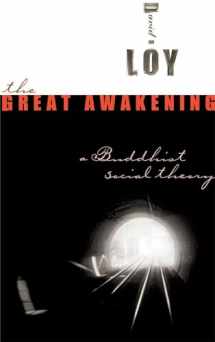
The Great Awakening: A Buddhist Social Theory
Book details
Summary
Description
The most essential insight that Buddhism offers is that all our individual suffering arises from three and only three sources, known in Buddhism as the three poisons: greed, ill-will, and delusion. In The Great Awakening, scholar and Zen teacher David Loy examines how these three poisons, embodied in society's institutions, lie at the root of all social maladies as well. The teachings of Buddhism present a way that the individual can counteract these to alleviate personal suffering, and in the The Great Awakening Loy boldly examines how these teachings can be applied to institutions and even whole cultures for the alleviation of suffering on a collective level.
This book will help both Buddhists and non-Buddhists to realize the social importance of Buddhist teachings, while providing a theoretical framework for socially engaged members of society to apply their spiritual principles to collective social issues. The Great Awakening shows how Buddhism can help our postmodern world develop liberative possibilities otherwise obscured by the anti-religious bias of so much contemporary social theory.


We would LOVE it if you could help us and other readers by reviewing the book
Book review





